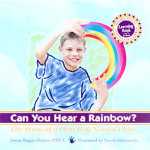What is it like to not be able to hear and communicate with other kids?

What should you know?
A hearing loss can happen when any part of the hearing system (the brain, the auditory nerve, or the ear) is not working in the usual way. Hearing loss can vary greatly among people and can be caused by many things. Let’s learn more…

Follow the 8 steps below for your Web Quest.
Step 1: See what you think about kids who have a hearing loss. Take the Fact Checkup!
Step 2: Think about some questions to ask. Let’s see…
Step 3: Check out some quick facts.
Step 4: Check out some great websites to help you learn more.
Step 5: Find out about people you can read about to help with your Quest.
Step 6: Learn about movies and books that can give you information.
Step 7: Check out your school and neighborhood.
Step 8: Now see if your attitudes have changed. Take the Fact Checkup again.
Let’s see…
A hearing loss can happen when any part of the hearing system (the brain, the auditory nerve, or the ear) is not working in the usual way. Hearing loss can vary greatly among people and can be caused by many things. Hearing loss can affect a child’s ability to develop speech, language, and social skills. The earlier children with hearing loss start getting services, the more likely they are to reach their full potential.

Some things to think about….
What are some things that will help me understand what hearing loss is all about?
If a child cannot hear, how does he or she talk with other kids?
What is sign language and is it easy to learn?
How can I learn to communicate with kids who are deaf?
What is a cochlear implant and how does it help some people who are deaf?
Can you think of more questions to help you in your Quest?
Click here to write them down so you’ll remember them as you move through this QUEST.
Quick Facts
Here are some facts that may help you answer some of your Web Quest questions. Remember, these facts will only give you basic information.
- Hearing loss in children. What are we talking about? Try this experiment to see if you can understand hearing loss better.
- American Sign Language, like all other languages, has an interesting background in culture and history. American Sign Language (ASL) is based on sign language that began in France in 1771. Abbe Charles Michel L’Epee opened the first free public school for the deaf in Paris. Many deaf people came to the school. The deaf children had been signing at home and brought some signs and gestures with them. L’Epee was not deaf but he used these different home-made signs and gestures to create a standard sign language. L’Epee’s standard sign language eventually became French Sign Language. Laurent Clerc of France and American Thomas Hopkins Gallaudet used that French sign language to shape present day ASL. It is interesting that Clerc had a hearing loss but Gallaudet did not.
- Most babies have a hearing screening soon after birth, usually before they leave the hospital. Each year in the United States (U.S.), as many as 5,000 to 18,000 babies are born with a hearing loss. The cause of hearing loss for many babies is not known, and hearing loss can go unnoticed for years if the baby missed the hearing screen at the hospital.
World-Wide Web Search

ASL University (LifePrint.com)
To give you a “taste” of American Sign Language, check out this website. Just remember that ASL is not just about signing visual concepts (vocabulary), it requires signing in a particular order and a particular manner. Learning signs from a computer is somewhat limited but will give you an idea of how to sign some words. Try the First 100 signs to learn some simple sign language.


Cochlear Implants
Cochlear implants are devices that can provide sound for people who receive little or no benefit from hearing aids.

KidsHealth Organization: What is hearing Loss?
You know what hearing is, but what is hearing loss? Hearing loss happens when there is a problem with one or more parts of the ear or ears. Read more about hearing loss, going to an audiologist, and if loud music will hurt your ears.
Take a look at this CDC site to get more information about what parents might do if they suspect that their child has a hearing loss.
People
Read about people, who are deaf or have a hearing loss. Learn how they have become successful adults and learned to communicate with people.

Bill Clinton Because of a hearing loss, the former U.S. president wears hearing aids. He thinks the hearing loss is a result of gunfire while hunting, and listening to loud music. Like many with hearing loss, he ignored his hearing difficulties for years until he finally had a hearing test.

Ronald Reagan Former U.S. president Ronald Reagan’s ear doctor said the President’s hearing loss began in the 1930s, during his acting days, when a pistol was fired very close to his right ear.
Derrick Coleman is the first deaf offensive football player in the NFL. At age 3, he was tested and found to have hearing loss after his parents noticed he is talking later than other children. He wears hearing aids in both ears. He experienced bullying growing up from classmates and even teachers.

Linda Bove joined Sesame Street in 1971, becoming a full-time cast member in 1977. Linda Bove was born in Garfield, New Jersey to two deaf parents. In 1963, Bove became a founding member of the National Theatre of the Deaf, and in 1991.
Movies and Books
Here are some movies and books about hearing loss and sign language.

How Your Ears Work
Presented by: Kids Health
How do you hear? Watch this ear video to step inside the ear.

Let’s Talk About Deafness
Publisher: Powerkids Press (August 1999)
Reading level: Ages 9-12
Discusses deafness, its causes, and how deaf people cope with their condition and live full lives despite their inability to hear.

Can You Hear a Rainbow? The Story of a Deaf Boy Named Chris
Publisher: Peachtree Pub Ltd (May 2002)
A deaf child tells how he uses sign language, hearing aids, and his other senses to communicate, how his friends help him, and how he goes to public school with an interpreter.
Ages 4-8
A Birthday for Ben
Kate Gaynor
This book uses Ben’s birthday party to illustrate the challenges of hearing loss, but also the ways in which we are all the same. A good book to teach concepts of understanding and inclusion.
Cosmo Gets an Ear
Gary Clemente
This book uses Ben’s birthday party to illustrate the challenges of hearing loss, but also the ways in which we are all the same. A good book to teach concepts of understanding and inclusion.
Ages 9-12
Rally Caps
Stephen J. and Jodi Michelle Cutler
After 10-year old Jordan is injured in an accident, he finds it difficult to return to his favorite sport of baseball. Fortunately, he meets Luca at summer camp, a deaf boy who wears a cochlear implant and inspires Jordan with a “nothing is impossible” attitude. Find out how they rally together in the biggest game of Jordan’s life.
My School and Neighborhood
What should you do if you were a parent of a baby or young child that you suspect has a hearing loss? Look at the list of choices below and see if you can figure out which ones would be good to do if you think your child has a hearing loss.
| Choices | Good Choice | Bad Choice |
| – Get a hearing screening before the child is one month old | X | X |
| – Ignore the hearing loss and hope he will outgrow it | X | X |
| – Talk to other parents of children with a hearing loss | X | X |
| – If a medical exam confirms a loss, seek help from professionals about intervention options | X | X |
| – Take your child out of school | X | X |
| – Assume that since he cannot communicate and talk, he will not succeed | X | X |
| – Talk to people who have had hearing losses to ask questions | X | X |
Links outside this website
We provide links to other web pages if you want to learn more about a topic. Some of these pages are on the CDC web site and others are on outside websites. Links to organizations and companies outside of CDC are included for information only. CDC has no control over the information at these sites. The views and opinions of these organizations are not necessarily those of CDC, the Department of Health and Human Services (HHS), or the U.S. Public Health Service (PHS).
- Page last reviewed: August 9, 2017
- Page last updated: August 21, 2017
- Content source:


 ShareCompartir
ShareCompartir